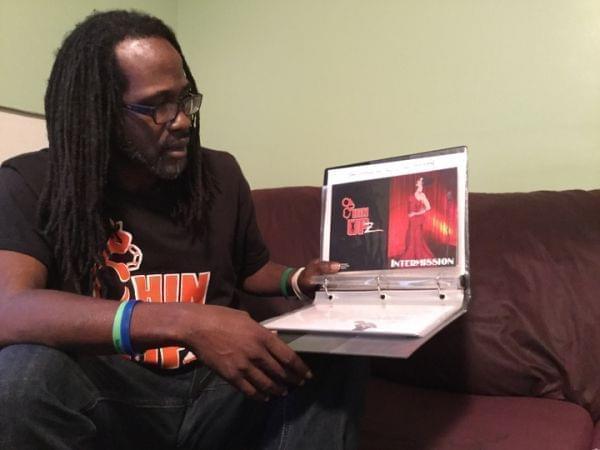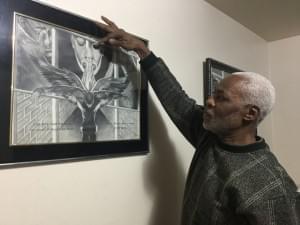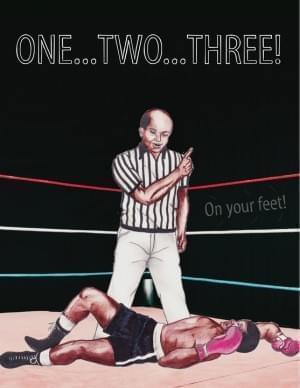Startup Company Provides Greeting Cards For Those Incarcerated

Chin Upz founder Kevin Williams shows examples of some of the cards available from his company. Kate McQueen/for Illinois Public Media
Email, texts and social media may be the most common ways to send a message. But that’s often not the case for the millions of Americans with friends or family in prison. Cards and letters are the least expensive and most accessible way for many behind bars to keep in touch. Still, finding the right words to say is not always easy.
One area company is creating cards to meet that need.
Kevin Williams' best friend had go to prison.
"And when he came home I picked him up from the bus station. And they have them out there with their little bag of personal items and grey sweats and he jumps in the car and he had this big, old shoe box full of greeting cards," Williams said. "I was like, what did they say? There aren't that many holidays, you haven't even been gone that long."
"He was like, they don't say really much of nothing, you know. It's just something they buy so that it's not just a naked money order," Williams said. "And that's when it clicked. Yep, this is what I need to do. I'm going to start a line of cards for people who are in prison."
And that's what he did. Williams, a University of Illinois building service worker and founder of the Rantoul startup Modern Lyfe Card Company, launched his anchor greeting card line—called Chin Upz— in April 2016.
Although the greeting card industry is struggling in the age of social media, Williams says cards still play a vital role inside prisons.
"The outside world, we've gone digital pretty much. But inside is still Pony Express. That's how they get most of their information," Williams said. "When they get a letter, it's not like when the mailman comes to our house and drops a letter in the mail. Mail day is a big day, a big day inside."
The problem is finding a card with the right message.
"Not just some cookie cutter that says "Miss You" and that's it,' Williams said. "I didn't think that was appropriate or proper."
Williams takes great care when designing his cards. To find the right emotional tone, he looks for inspirational messages and motifs from the worlds of sports and art.

Chin Upz illustrator Sammie Lotts shows examples of his artwork.
Formerly incarcerated artists, like Sammie Lotts, help craft the product. He created the art for Chin-Upz's best-selling cards. Lotts knows,
"The longer you do in prison, the less letters you start to get," Lotts said. "But sometimes people will pick up a card. They don't have to write so much, just a little note. The card speaks for itself."
An example is the card called "The Boxer," illustrated by Lotts and written by Williams. The front shows,
"... a man, it's obvious that he's been knocked down and the ref is counting him out," Lotts said. "So I mean this is basically their situation in a picture, you know. You've fallen and everybody's counting you out."

"The Boxer," an example of one of the cards available from Chin Upz.
And inside, "Some say it was a solid punch. I say you slipped. Some think the decision should be unanimous. I say the judges are crooked. Some just came to watch you fall. I'm here to see you get up. Stay in the fight. Don't throw in the towel. I'm in your corner."
The message rang true for Tyrese McCurry, a hobby boxer and William's colleague at the University of Illinois.
“It touched me. My dad is incarcerated right now, so any little thing, it matters," McCurry said. "And something like that I know would have touched him too."
McCurry was Chin Upz's first customer.
Annette Taylor is also a Chin Upz customer. And the coordinator of the Ripple Effect, a group that meets monthly at Champaign's Bethel AME Church, to write cards and letters to incarcerated people in Champaign County.
"Keeping them connected to the outside world is very important," Taylor said.
Taylor sees firsthand how regular communication helps keep families together during incarceration. And there’s research to back her up. According to the nonprofit Vera Institute of Justice, "incarcerated people who maintain supportive relationships with family members have better outcomes—such as stable housing and employment—when they return to the community."
That's the bottom line for Williams too.
"People need to know that... just being a positive connection to somebody can really make a difference when they finally touch down," Williams said.
Kate McQueen is a recent graduate from the College of Media at the University of Illinois, with a degree in journalism.
Links
- For Victims Of Unjust Imprisonment, Budget Impasse Keeps Them Waiting
- Illinois Prison Staff Trained On Mental Illness, But Do They Really Buy In?
- Six Illinois Prison Workers Treated After Inmate Attack
- Illinois Issues: What Will It Take To Stem Mass Incarceration?
- Health Care Law Could Cut Down On Incarceration Rates
- Incarcerated Mothers, Fusion Energy & Higher Ed Funding

